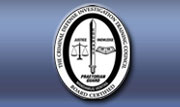|
Featured Speakers:
Timothy Masters: On Feb. 11, 1987, the body
of Peggy Hettrick was discovered by a bicyclist in a field south
of Fort Collins, Colorado. She had been stabbed to death, and her
genitalia had been surgically mutilated. Timothy Masters, 15-years
old at the time, lived near the scene and had walked by the body
on his way to school but failed to notify authorities. He was later
interrogated and his school locker was searched. Police found graphically
violent sketches that Masters penned in a spiral notebook. However,
police were not able to link him to the murder. Eleven years later,
in 1998, Masters was arrested for the murder. A year later, he was
convicted of the murder and was sentenced to life in prison. The
prosecution pointed to the drawings as the key evidence of guilt.
He served over 10 years in prison before he was finally set free
in Jan. of 2008. His case was the first touch DNA exoneration in
the US. Last fall, his story Drawn to Murder was featured
on CBS 48 Mystery.
Linda Wheeler-Holloway: Linda currently
works as an investigator for the Office of District Attorney in
Fort Morgan Colorado. In June of 1991, Linda was assigned as the
lead detective for the Ft. Collins police department’s homicide
investigation of the 1987 murder of Peggy Hettrick. A cold case
investigation, the prime suspect four years later was Timothy Masters,
who was by now a young man was serving in the US Navy. A year later,
in 1992, Ft. Collins police issued an arrest warrant for Masters.
After interviewing Masters, Holloway had doubts that he was involved.
She decided not to arrest him. After she retired from the police
department, another detective took over the case and continued to
pursue Masters as the prime suspect. The case continued to haunt
Holloway after Masters was convicted and sentenced to life in prison
in 1999. While traveling in Holland on vacation in 2005, Linda Wheeler-Holloway
discovered the pioneering work of forensic scientists Selma and
Richard Eikelenboom and their ability to recover skin epithelial
cells of a perpetrator from the clothing of a crime victim. When
she returned to Colorado, Linda contacted Timothy Masters’
attorneys and told them about using touch DNA testing. The results
of this testing exonerated an innocent man.
Selma Eikelenboom: Selma is a forensic medical
expert. In 1999, she became the Forensic Medical Examiner for Amsterdam’s
Municipal Medical and Health Authority. She later worked in the
crime scene investigation unit for the Netherlands Forensic Institute
Department of Biology. She worked closely with European law enforcement
authorities and the judicial system. In 2003, she formed her own
company, Independent
Forensic Services, a private laboratory in the Netherlands that
specializes in recovery of trace evidence and Touch DNA testing
that she operates with her husband Richard.
Richard Eikelenboom: Richard is a forensic
scientist specializing in trace evidence recovery and bloodstain
pattern analysis. He also worked for the Netherlands Forensic Institute
Department of Biology. In 2005, he joined Selma as a partner at
Independent
Forensic Services. Richard and Selma’s work on the Timothy
Master’s case pioneered the use of Touch DNA sample recovery
methods in the US. The Master’s case was the first exoneration
case in the US to utilize touch DNA.
Barie Goetz: Barie is a forensic scientist
specializing in crime scene reconstruction and bloodstain pattern
analysis. He worked for the Indiana State Police and the Colorado
Bureau of Investigation Laboratory Systems. In 2004, he retired
as Director of the CBI Regional Laboratory in Pueblo, Colorado.
Barie then started Sangre de Cristo Forensic Services, where he
utilizes his 30 years of experience assisting the judicial system
in areas of crime scene reconstruction and post-conviction review.
He worked as the Forensic Investigator on the Timothy Master’s
case, reconstructed the series of events of the murder, and assisted
Richard Eikelenboom with the recovery of touch DNA samples.
Maria Liu: Maria Liu is a founding partner
in the law firm of Collins, Liu and Lyons LLP located in Greeley,
Colorado. She specializes in criminal defense and post conviction
relief. She received her law degree from Southern Illinois University.
During law school Ms. Liu worked at the Illinois Migrant Legal Assistance
Project and Land of Lincoln Rural Legal Aid. She began her career
as a Deputy Public Defender at the Colorado Public Defenders Office.
She enjoyed working with indigent clients because they are often
the people that need lawyers the most. She served as president of
the Weld County Bar Association from 2004-2005. Ms. Liu received
the Colorado Criminal Defense Bar’s 2008 Gideon Award and the
ACLU’s 2008 Sherman Award for her representation of Tim Masters.
David D. Wymore: David maintains a solo
practice in Boulder, Colorado. He graduated from The Ohio State
University and The University of Colorado School of Law. He became
a Colorado Deputy Public Defender in 1976 and the Colorado Chief
Trial Deputy from 1982 to 2004 when he retired. As the Chief Trial
Deputy for the statewide defender system, he represented death eligible
clients across the State of Colorado. Mr. Wymore also teaches trial
tactics and death litigation across the United States as well as
in foreign countries. He is on the faculty for numerous national
organizations involved with training in capital litigation. He is
primarily recognized for his creation of the COLORADO METHOD
OF CAPITAL VOIR DIRE. He is presently involved with the on going
Capital Voir Dire project of NACDL and The Southern Center for Human
Rights in establishing a permanent home for his training seminars
at The University of Colorado Law School. Mr. Wymore was featured
in the May 1997 publication of The American Lawyer under
the caption Too Effective for his work in keeping Colorado’s
death row empty. A feature length documentary entitled The Life
Penalty about Mr. Wymore and the Colorado Method of Jury Selection
is presently being shown in the United States and abroad. Mr. Wymore’s
various awards include: the Colorado Criminal Defense Bar 1997 Jonathon
Olom Award; University of Colorado, School of Law 2001 Distinguished
Alumni Award; Colorado Criminal Defense Bar 2008 The Gideon
Award; Boulder County Bar Association 2008 Ron Porter Award
of Merit; and the ACLU Foundation of Colorado 2008 Edward
Sherman Award. David Wymore’s most recent case of national
interest involved the 2008 exoneration of Tim Masters for his wrongful
conviction in the 1987 homicide of Peggy Hettrick in Ft. Collins,
Colorado
Bill Clutter: Bill Clutter began his career
as a criminal defense investigator in 1985 working for Springfield
attorney Michael Metnick. In 1988, he was assigned to investigate
his first case of actual innocence in the Naperville murder case
of Jeannine Nicarico. That case was one of the first cases in Illinois
in which DNA testing was undertaken. The early DNA test that was
conducted by Dr. Edward Blake was a full profile match to serial
killer Brian Dugan, corroborating his 1986 confession to the Nicarico
murder. This early test conducted in 1988 exonerated Alejandro Hernandez,
but was unable to exclude Rolando Cruz. Subsequent improvements
in DNA testing technology later exonerated Cruz, as well. Bill Clutter’s
post-conviction in the case of Randy Steidl and Herbert Whitlock
that began in 1991 eventually led to their release from prison.
Steidl had been sentenced to death and was released in May 2004.
Whitlock received a life sentence and was set free four years later.
Following Barry Scheck’s call to create a network of Innocence
Projects, Bill met with his former legal studies professor Nancy
Ford and Larry Golden at the University of Illinois at Springfield
and founded the Downstate Illinois Innocence Project. He currently
serves as Director of Investigations for the Project, in addition
to maintaining a private detective agency.
John Hanlon: John Hanlon began his legal
career in 1983 as a staff attorney with the Illinois
State Appellate Defender’s Office. Shortly after taking
that position, John and co-counsel Tim Gabrielsen landed the assignment
of defending Rolando Cruz, following Cruz’s 1985 conviction
and death sentence for the murder of Jeanine Nicarico. In 1988,
John and his co-counsel persuaded the Illinois Supreme Court to
reverse Cruz’s conviction. When Cruz was convicted a second
time and sent back to death row in 1990, John recruited a young
lawyer by the name of Larry Marshall, a new professor at Northwestern
Law School, to work with him on Cruz’s second appeal. That
was the beginning of the Innocence Project movement in Illinois.
The two succeeded in getting Cruz’s conviction vacated a second
time. The third trial resulted in the dramatic acquittal of Rolando
Cruz after it was revealed that two detectives had fabricated a
"vision" confession. William Kunkel as appointed as special
prosecutor, leading to the indictment of police and prosecutors
who were known as the DuPage 7. John’s work on the case of
Joe Burrows and Randy Steidl contributed to their release from death
row, and the Burrows case was cited by Gov. Ryan when he announced
a moratorium on capital punishment. He currently serves as an adjunct
professor at UIS teaching a class called Wrongful Convictions.
For the DVD registration and tuition information
email Bill Clutter: billclutter@email.com
or download a registration form from UIS
here.
On Nov. 12, 2009, the Springfield law firm of Feldman,
Wasser, Draper & Cox filed a post-conviction DNA testing motion
on behalf of Thomas McMillen, making the first request in Illinois
for Touch DNA testing. They have donated their legal services to
the Downstate Illinois Innocence Project. McMillen, who is serving
a life sentence, originally faced the death penalty in 1991 in Sangamon
County for the murder of Melissa Koontz. His conviction was based
on the false confession of a mentally disabled man, Donald "Goose"
Johnston, who claimed to have witnessed the murder. Every major
detail he provided to police conflicted with the crime scene evidence.
Johnston, who had been the first to face the death penalty, received
a lesser sentence and served less than eight years in prison in
exchange for his cooperation and testimony against McMillen. Prosecutors
also used the testimony of five jail house snitches, claiming that
McMillen had confessed to each of the five cellmates.
Because he did not receive the death penalty, McMillen
did not receive post-conviction counsel or resources to investigate
his claims of innocence. His trial had the same flaws as the 13
death row exoneration cases. According to the Governor's Commission
on Capital Punishment" "There are a number of cases where
it appeared that the prosecution relied unduly on the uncorroborated
testimony of a witness who has something to gain . . .
In some cases this was an accomplice, while in
other cases it was an in-custody informant."
The prosecution in the McMillen case relied unduly
on both accomplice testimony and the unreliable testimony of jail
house informants. The accomplice, Goose Johnston, recanted his trial
testimony in July of 2008, that was video-taped by Bill Clutter
and two of his students.
Click onto the links below to read the petition
and supporting exhibits:
Defendant's
Motion for Post-conviction Forensic DNA Testing Pursuant to 725
ILCS 5/116-3
Affidavit
of William Clutter
7/20/08
interview of Donald Johnston by Bill Clutter
Affidavit
of Richard Leo
11/11/08
interview of Donald Johnston by Richard Leo
Affidavit
of Richard Eikelenboom
|





